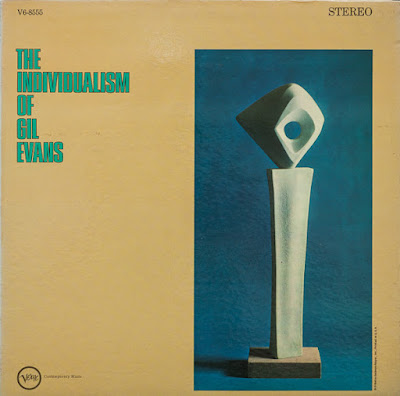Recorded over four sessions between September 1963 and July 1964, the five songs that make up the original LP of The Individualism of Gil Evans seem to chronicle a desire for some sort of perfection that likely frustrated producer Creed Taylor, himself a perfectionist. It’s probably the same sort of thing that flummoxed Evans and Davis on what Columbia put out as Quiet Nights.
But if the result is imperfect, The Individualism of Gil Evans comes as close as you can get to a perfectly satisfying musical statement from Gil Evans.
This exquisite album is probably best known for its signature piece, “Las Vegas Tango.” Named because “it had a kind of open sound like the plains,” “Las Vegas Tango” is a brilliant two-part invention: the early part gets a mournful solo by trombonist Jimmy Cleveland while the brassy part (which screams of the Las Vegas strip to these ears) benefits by guitarist Kenny Burrell, almost buried in the mix.
It’s easy to miss the significance of Paul Chamber’s moody bass and Elvin Jones’s aggressive percussion on “Las Vegas Tango”’s affective and hypnotic draw. But it’s their work that helps makes this track as singular and memorable as it is.
Unlike other songs present here, Evans never performed “Las Vegas Tango” again – until bandleader and Evans biographer Laurent Cugny persuaded the song’s composer to revive it during a European tour at the end of his life. “Las Vegas Tango” is hardly the standard it should be. But it has been effectively covered by artists as diverse as Robert Wyatt, Michael Shrieve, Nels Cline, Mike Gibbs and, most notably and effectively by Gary Burton.
“The Barbara Song” (a.k.a. “Barbarasong”) is a haunting theme taken from Kurt Weill’s music for Bertolt Brecht’s “play with music” The Threepenny Opera. The song has not often received much coverage in jazz, but it was notably covered in 1962 on a Weill tribute album by Andre Previn and J.J. Johnson. Here, Evans crafts some gorgeous, dreamlike horn swaths while offering his always welcome “arranger’s piano.” Wayne Shorter takes a beautifully lyrical solo that is particularly notable as that aspect of his playing hadn’t been much in evidence at the time.
“Hotel Me” is one of the themes Evans and Miles Davis wrote for the play “Time of the Barracudas” (more on that later). If this one is a bawdy stripper-type theme, it is certainly one of the classiest. Evans balances low brass with wispy flutes and takes a number of solo spins on piano, playing – as he himself says in the album’s liner notes – “real broad.” Evans continued performing “Hotel Me” throughout the remainder of his life, but the song was also known as “Jelly Rolls” by the early seventies.
In such company, the likeable but ever-so brief ”Flute Song,” a feature for Al Block, and “El Toreador” (spotlighting trumpeter Johnny Coles) feel more like filler than fleshed-out melodies. Both are far too fleeting but impressionistic and ever-Evanescent orchestral pieces that serve more as transitions than compositions – or, like outtakes from the Davis-Evans masterwork Sketches of Spain (1960).
The Individualism of Gil Evans was released in September 1964 to mostly favorable fanfare. "’Exotic Jazz,’" wrote Billboard on September 26, 1964, “truly special, highly stylized and individualistic to the last note.”
”The 88'er's thematic originality and inventive instrumentation,” wrote Cash Box, somewhat condescendingly, “is evident throughout these highly individual performances” (also September 26, 1964). Notice how both reviews use the album’s title as a point of contention, making it difficult to discern whether individuality was considered a good thing or bad.
Individuality doesn’t normally sell records. But it leaves a mark, as this record surely did. From its striking cover to the amazing music within, this album continues to speak volumes.
The Individuality of Gil Evans was nominated for a Grammy Award as Best Instrumental Jazz Performance – Large Group or Soloist with Large Group. While the Miles Davis-Gil Evans set Quiet Nights was also nominated that year, both lost to guitarist Laurindo Almedia’s lovely but long-forgotten Guitar from Ipanema.



No comments:
Post a Comment